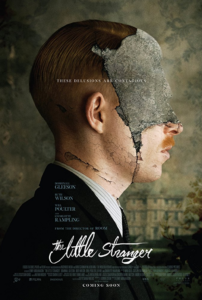Subtle when it should have been obvious, restrained when it should have unleashed, “The Little Stranger” is a minor addition to the Victorian horror genre.

 Sadly, the world today is built around attacking the messenger. But sometimes that ordinarily destructive impulse is correct. Perhaps, Lenny Abrahamson (“Room” and “Frank”) was not the right director to tackle the work of author Sarah Waters, whose novel upon which this film is based. Like it or not, we are in a time that recognizes the indelible tonal stamp that a director’s gender, sexual orientation, race, and even age has on a picture. A movie like “The Little Stranger” may have benefitted from a director uniquely attuned to the story’s underlying message. Under Abrahamson’s unquestionably talented and sure hand that message is not explicit or engaging enough to resonate as powerfully as it might have had the film been given a more aggressive direction.
Sadly, the world today is built around attacking the messenger. But sometimes that ordinarily destructive impulse is correct. Perhaps, Lenny Abrahamson (“Room” and “Frank”) was not the right director to tackle the work of author Sarah Waters, whose novel upon which this film is based. Like it or not, we are in a time that recognizes the indelible tonal stamp that a director’s gender, sexual orientation, race, and even age has on a picture. A movie like “The Little Stranger” may have benefitted from a director uniquely attuned to the story’s underlying message. Under Abrahamson’s unquestionably talented and sure hand that message is not explicit or engaging enough to resonate as powerfully as it might have had the film been given a more aggressive direction.

The perspective used in “The Little Stranger” is detached and vacant. Characters act with the same measured restraint behind closed doors as they do with the doors wide open. This cloistered, arms-length method of story-telling betrays the underlining theme to be conveyed: hiding away one’s true self sours the soul.
An upstairs-downstairs, post-Victorian era, British dramatic horror film, “Stranger” is creepy in sporadic doses, but don’t expect it to scare you. The story has Dr. Faraday (Domhnall Gleeson) called to the stately home of the troubled Ayres family to check on a sick maid. Once at the decaying estate, memories from Dr. Faraday’s childhood flood over him. The Ayres estate has fallen on hard times. The Ayres only son, Roderick (Will Poulter), charged with the family affairs, has returned from war horribly scarred and emotionally damaged. His sister, Caroline (Ruth Wilson), has given up on her educational and personal goals in order to help her mother (Charlotte Rampling) with her struggling brother at home.

Dr. Faraday is saddened by the decline of the place. But he sees therein an opportunity. The thin, impeccably dressed, introverted doctor may hold hope that as times change, and attitudes along with it, he can elevate himself to another social and economic class. And maybe he could even find a form of convenient romance with Caroline in the process. But something wicked is lurking within the old mansion that may have other ideas. It is that lingering, baleful mystery that threatens to tear apart anyone it entangles.

Expertly shot by Ole Bratt Birkeland in the familiar “Downton Abby” style, the camera captures virtually every bland color of brown, baige, grey—images that mirror the milquetoast narrative. While this approach is completely appropriate, there are few, if any, bursts of color that may have punctuated the dour visual tone. It’s a depressing pallet on top of a further depressing plot.
Gleeson is very good as Faraday. Playing a confused intellectual, who has little interest in sex or physical gratification, Gleeson methodically constructs the makings of a psychopath, except an entirely one-note one. There’s a mystery to Faraday, that plays out in flashback, but ultimately seems less important and interesting as the story progresses.

As Faraday’s emotional foil, we get Caroline. An emerging old maid type, aging past her due date, Wilson plays Caroline with a lot more energy than Gleeson, but still is committed to restraint even when her lustful feelings for Faraday seem to manifest themselves. Like a lot in this slow narrative, the cast is made to hold back, when they really ought to be playing, at least, one scene big.
The thing about “The Little Stranger” is that it is well-made, well-acted, and somewhat interesting. But it’s not entertaining, nor does the deliberate telling get its critical message across. The idea, I think, was to use the horror elements to make points about sexuality, age, and class. But without playing up any one element, the result is dull and often stogy theatre that leaves the viewer to try to read into the subtext. Too much subtext and not enough text.

I struggle as a writer and as a filmmaker with what stories to tell. What in my makeup qualifies me to tell a particular story? My gender, my sexuality, my age these are things I cannot control and they inform on my perspective. So, when I see a film like “The Little Stranger” that seems to want to burst forth and talk openly about sexuality and class, I wonder who would be the best spokesperson. Lenny Abrahamson is a major talent, and I’m unabashedly a fan of his prior work, but this film may have been wrong for him. And Waters, whose novel “Fingersmith” provided the inspiration for the edgy Chan-wook Park film “The Handmaiden,” may have needed a more explicit filmmaker to shepherd her material on screen.
Without assassinating the messenger, I take issue with the perspective and overall approach to “The Little Stranger.” And that fault, like it or not, falls at the feet of director Abrahamson. It’s not an entirely uninteresting failure, but a failure none-the-less.
